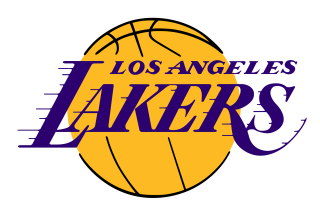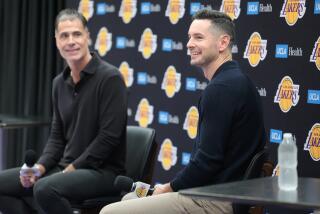On Phil Jackson’s Lakers coaching staff, familiarity breeds contentment
- Share via
It’s not as though the Lakers’ assistant coaches have a portal, accessible only through a cubbyhole in El Segundo, winding into the mind of head Coach Phil Jackson.
It only seems that way sometimes.
That’s perfectly natural when a coaching staff has been together, for the most part, through two franchises (Chicago and Los Angeles), power struggles, championship runs and an earthquake or two.
Lakers assistant Frank Hamblen laughed a bit when he was asked whether he often knew what Jackson was going to say before he said it.
“We’ve been together quite a long time,” he said. “I’ve been around Phil for a long time. We’re all on the same page and we think alike. We think his way. He’s got us all thinking his way.”
Lakers assistant Jim Cleamons was on Jackson’s staff in Chicago, and Hamblen joined the Bulls under Jackson when Cleamons departed in 1996 to coach the Dallas Mavericks.
It says something about continuity when the “kid” of the Lakers’ coaching staff happens to be Brian Shaw, who started in the 2004-05 season. That Shaw would eventually become a coach almost seemed a foregone conclusion. Hamblen was one of many to predict that Shaw, even in his Lakers playing days, would later coach.
One hallmark of Jackson’s early Lakers days was the byplay between Jackson and triangle-offense guru Tex Winter. Winter won nine championships with Jackson, the final three with the Lakers. “It’s father-son, it’s brother-brother, mentor-to-pupil,” Hamblen told The Times in 2000, speaking of the Jackson-Winter dynamic. “It’s just terrific. It actually could probably play in Vegas at times.”
Many Lakers roads lead to Winter. Lakers special assistant Craig Hodges, designated as the team’s shooting coach — which makes sense, considering he appeared in the first eight NBA three-point contests — first played for Winter at Long Beach State and later for Winter and Jackson with the Bulls.
The special nature of the Lakers coaching fraternity means that out of sight doesn’t mean dropping out of the family picture album. Winter, now living in Oregon, had a stroke a little more than a year ago but was able to join the Lakers for a game at Portland in February and spoke to the team before the game.
Kurt Rambis, a Lakers assistant for 10 seasons, just completed his first season as head coach in Minnesota and has been at Lakers playoff games this spring.
Rambis essentially coordinated the defense in his last season with the Lakers, and they did not fill his position when he departed, spreading the defensive responsibilities among the remaining three assistants, Hamblen, Cleamons and Shaw.
New on the scene this season is former NBA player Chuck Person, who is a special coaching assistant and advisor. Person worked with Ron Artest at Indiana and later at Sacramento, and lately, has worked more closely with Kobe Bryant.
“When I first started to average a lot of points, started to play good basketball, it had a lot to do with Chuck,” Artest said of Person. “He taught me how to play in the NBA.”
The workload for the assistants is not divided purely in a positional sense; instead it is determined by the upcoming opponent.
Each of the three assistants is assigned to handle scouting, game plans and presentations specific to anywhere from eight to 10 teams. For instance, Shaw is responsible for Phoenix and Orlando. Cleamons had Oklahoma City, and Hamblen was assigned Boston, Utah and Denver, among others.
“It comes out at the beginning of the year,” Cleamons said. “Each one of us knows when it is our time to step up. We’re going to be prepared, make our presentation, hope the team will accept it and understand how the game plan was put together.”
There is, as you might guess, a method to Jackson’s distribution patterns.
“With me,” Shaw said, “I know he [Jackson] specifically said, I’m going to give you teams that have coaches that are your contemporaries and your age — guys that you played against that are coaching now because you’re young and at some point when you become the head coach, you’ll be coaching against these guys. They’ll still be coaching, so start familiarizing yourself with them now.”
Another advantage of the experienced staff is the collective sense of hoops history — the ability to fill in the branches of an NBA family tree.
“The biggest kick I get in the mornings when we meet is the history I get from these coaches to make the connections,” Shaw said. “It’ll be a young coach like a Scotty Brooks at Oklahoma City who coached under maybe someone that coached under somebody that coached under Hubie Brown who was connected to somebody who was connected to Red Holzman from back in the ‘60s.
“Especially when Tex Winter was here. They’ll say, ‘Oh, this system came from such and such back in the ‘50s,’ and you can connect. . . . So you see the tree.”
twitter.com/reallisa
More to Read
All things Lakers, all the time.
Get all the Lakers news you need in Dan Woike's weekly newsletter.
You may occasionally receive promotional content from the Los Angeles Times.








